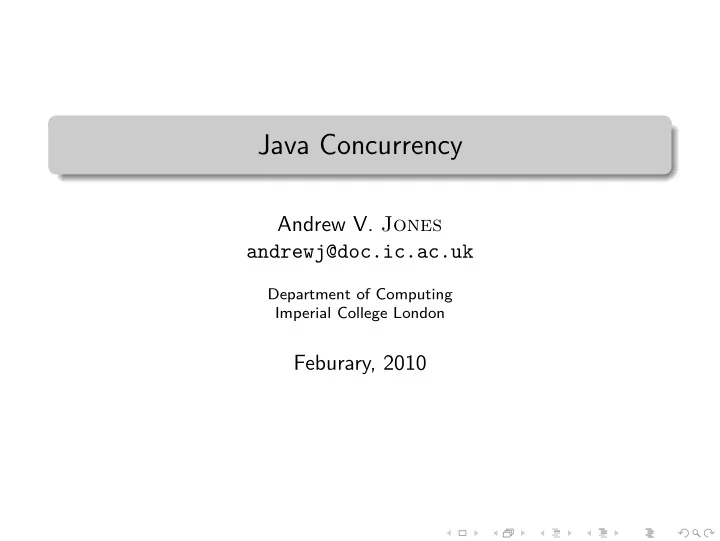

Java Concurrency Andrew V. Jones andrewj@doc.ic.ac.uk Department of Computing Imperial College London Feburary, 2010
Introducing Threads Threads are a way of running separate pieces of code Most of the code you’ve written so far will have, implicitly, used a single thread Their main aim is to attempt to do more than one thing at once On a single-core machine, one thread can continue while another is “blocked” (waiting) On a dual-core (or processor) machine, they allow for parallelism of code Andrew V. Jones Java Concurrency
Your First Thread extends SuperClass, Thread ThreadExample public class SuperClass , Thread extends Why can’t we do this? Andrew V. Jones Java Concurrency
Your First Thread Two ways of creating a thread. . . extends Thread ThreadExample public class Thread extends implements Runnable public class RunnableExample Runnable implements Andrew V. Jones Java Concurrency
Basic Requirements To start using threads we need to implement the following method: void run (); public Lets look at some code. . . Andrew V. Jones Java Concurrency
Scheduling Threads Threads can be in a variety of different “states”: notifyAll() .start() Ready Sleeping Swapped Request Fulfilled .sleep( i ) Selected Running Blocked Java IO Request Also: Waiting and Dead Andrew V. Jones Java Concurrency
Scheduling Threads Running I/O Thread 1 Thread 2 Waiting What’s the most increase we can get with two threads? Andrew V. Jones Java Concurrency
Useful Thread ing Methods Causing a Thread to sleep sleep( long millis ); static void Causing a Thread to wait indefinitely void wait (); public final Causing a Thread to wake public final void notify (); notifyAll (); public final void Andrew V. Jones Java Concurrency
Useful Thread ing Methods Preemptively move a Thread from “running” to “ready” yield (); static void We can also cause the main program to wait until a Thread finishes. . . Waiting for a Thread void join (); public final Andrew V. Jones Java Concurrency
Using notifyAll “Producer” // produce data cond = true ; notifyAll (); // continue What’s wrong here? “Consumer” if ( !cond ) { wait (); } // consume data Andrew V. Jones Java Concurrency
Using notifyAll “Producer” // produce data cond = true ; notifyAll (); // continue “Consumer” while ( !cond ) { // wait for condition sleep (100); // or wait (); } // consume data Andrew V. Jones Java Concurrency
Locking via synchronized The synchronized keyword allows for “mutual exclusion” over sections of code. In Java, every object has an associated lock with it. Only a single object can have a lock on a piece of code at one time. The lock is released once the block of synchronized code ends. Locking with synchronized synchronized ( objectName ) { // code here } Andrew V. Jones Java Concurrency
Locking via synchronized Methods can be declared as synchronized: public synchronized void methodName () { ... } This is really syntactic sugar for the below: public void methodName () { synchronized ( this ) { ... } } If the running Thread is unable to obtain a lock on the synchronized object, it enters the “wait” state. The object will wait, indefinitely, to obtain the lock. Andrew V. Jones Java Concurrency
Deadlock Thread 1 synchronized ( A ) { synchronized ( B ) { ... } } Thread 2 synchronized ( B ) { synchronized ( A ) { ... } } What happens here? Andrew V. Jones Java Concurrency
Race Conditions Thread 1 Integer temp = someField; temp = temp * 3; someField = temp; Thread 2 Integer temp = someField; temp = temp + 1; someField = temp; What should the value of someField be at the end of the execution? Andrew V. Jones Java Concurrency
Race Conditions We can easily fix this ... Thread 1 synchronized ( someField ) { Integer temp = someField; temp = temp * 3; someField = temp; } And the same for Thread 2. Andrew V. Jones Java Concurrency
Examples Implementing a multi-threaded server Andrew V. Jones Java Concurrency
Questions Questions? Andrew V. Jones Java Concurrency
Recommend
More recommend